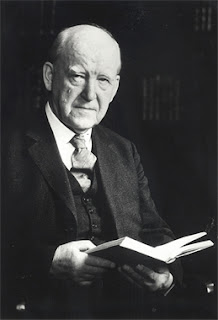Martyn Lloyd-Jones, Psychological Religion, and Online Communion
The spiritual and the psychological are not the same thing. This is a fact which Dr. Martyn Lloyd-Jones emphasised at several points in his ministry. It is possible in preaching to exert a pressure on people’s feelings and imaginations which can move them to action, quite independent of any understanding or faith response to the gospel message. Lloyd-Jones used the example of a preacher who described a burning building to illustrate the need to flee the judgment to come. The word-image became so vivid that his congregation literally fled, not from hell fire and the wrath of God, but from the church building, convinced that it was on fire! For the same reason, Lloyd-Jones was critical of some of Jonathan Edwards’ sermons, such as the famous “Sinners in the hands of an angry God”, because he felt that its intense descriptions could terrify people quite independent of the gospel truth being proclaimed.
In 1957 William Sargant, a controversial researcher in psychiatric medicine, published a book called ‘Battle for the Mind: a Physiology of Conversion and Brainwashing’. Its basic premise was that all religious conversions could be explained through the dynamics of brain-washing, as a rapid change of belief occurring via a mental collapse due to intense psychological pressure. Many thorough-going Christians were understandably disturbing by this so Lloyd-Jones wrote an article entitled “Conversions: Psychological or Spiritual?” In it he argued that some apparent Christian conversions can be explained without any reference to the supernatural. It is possible to move someone to ‘decide for Christ’ on a merely intellectual or emotional level without the regenerating work of the Holy Spirit. It is possible to conform to a great deal of ‘born again’ Christianity, without actually being born again, as that is taught in Scripture and traditionally understood by evangelical Christians. Preachers should therefore avoid ‘methods’ designed to bring people to premature and superficial decisions. As professing Christians we should all do everything we can to ensure that we have experienced the true life-giving work of the Holy Spirit and also to gain the kind of assurance which only the Holy Spirit can give.
Similar concerns have been expressed by others too. Jonathan Edwards himself wrote extensively in defence of the ‘revival’ phenomena which occurred in the English colonist churches in America during the period of the Great Awakening. He argued that there were true experiences of God and devilish counterfeit experiences and, between the two, there were experiences which could be explained as natural, human, psychological reactions to intense religious fervour. Just because something ‘feels’ like a spiritual blessing does not mean that it actually is a spiritual blessing. In the contemporary religious scene, many of the unusual phenomena associated with certain types of charismatic worship can be explained on a psychological level without reference to God or the supernatural.
In recent weeks some people have spoken of the ‘blessing’ they have received through participating in online communion services. That is not something to be dismissed out of hand but nor should it be accepted naively. God’s people have, throughout history, experienced profound blessings from God, sometimes in revival-degrees of power, during Holy Communion. However, I believe there are reasons to treat these current claims of blessing with a spoonful of caution because of the degree to which they can be explained simply in terms of the psychological dynamics of using the internet. The very fact that this blessing is supposed to have come just by changing the ‘context’ of communion from ‘in church‘ to ‘online’ points in that direction. This is because God’s blessings are not restricted by our environment but by our faith. If we were not experiencing ‘blessing’ before the problem is in us, not in our environment, and certainly not in God’s generosity. Unless the ‘blessing’ you are claiming has come from a definite improvement in your relationship with God I do not hesitate to say that it really cannot be anything more than a psychological phenomenon.
Say, for example, that during an online communion service, you are struck by an unusual sense of intimacy with the other Christians in your church. In a ‘normal’ communion, with the pews all facing forward, we tend to only see the backs of other people’s heads, apart from the minister and elders who are a long way off, down at the front of the meeting room. It is different on a ‘zoom’ screen. We can see everyone. The minister’s face is just one among many ‘thumbnail’ images. Somehow it feels special. You seem to sense that you are ‘all in it together’ in a way that you never felt before. What a blessing!
Or perhaps this experience is just psychological.
When you look at someone on a ‘zoom’ screen you typically only see their head and shoulders. Body language, such as non-verbal cues that indicate the other person is bored, uncomfortable, distracted, or disinterested, are hidden. Everybody is watching their screens, faces oriented towards the cameras, meaning that we tend to see people’s eyes for a lot longer than we would in a face-to-face conversation, where an extended gaze is often a sign of attraction or affection. You can see into other people’s homes, areas of their lives which would normally be kept behind closed doors unless you receive a personal invitation. And as you take part in Communion what you see is a panel of approving faces, giving a real feel-good factor as you mutually reinforce that taking part in this is something you have to do if you want to belong to ‘our group’.
At the same time, because we are physically located in our own homes, we will probably feel quite relaxed. We are in our safe place. We did not have to negotiate busy roads to get here. We did not experience the psychological cue to ‘put your guard up’ which occurs instinctively when you walk out of your front door. We orientate our screens so the camera faces the tidy part of the room, not the piles of mess and the dishes we haven’t washed yet. Others are able to see into our homes but we are able to control what they see and hear, turning the camera or microphone off at the press of a button. Some of us spend so much time using the internet for work, entertainment, and social media that simply sitting in front of a screen may feel more natural and within our comfort zones than the awkwardness of interacting in the flesh with people that we do not know that well. A few of us might even have internet addictions, where our dopamine system is primed to anticipate small neuro-chemical rewards each time we press the right button or feel that someone on the internet agrees with us.
All of these factors are already recognised by psychologists studying how human thinking and behaviour changes when we go online. Have you ever wondered why online relationships often move beyond the ‘get to know you stages’ more rapidly than face-to-face relationships, and why these intense relationships do not always survive the first meeting in-the-flesh? It is because the way we use the internet bypasses the psychological mechanisms which, in normal situations, cause us to keep some people at a safe distance and set boundaries which only those closest to us can cross.
In other words, the internet has the power to create feelings of intimacy where intimacy does not normally exist.
The feeling of intimacy in an online communion is largely a psychological phenomenon. Some will perceive it as a ‘blessing’. For others, the same dynamics could prompt very painful experiences. Whilst prolonged eye-contact can be an act of intimacy, in normal physical interaction it can also be used to show aggression and to intimidate. So some people find ‘zoom’ meetings stressful and wearying, even exhausting. Statistics suggest that levels of abuse taking place in churches and Christian homes are - disturbingly - not that different from those occurring in the rest of society. This means that as you look into their homes, there is a good chance that some of the faces you can see will be putting on a front, desperate to cover the hidden evils that are kept just off camera so that you will never see them. Others will be taking part in the service with the face of their abuser looking into their home and staring straight back at them with unbroken eye-contact. For some of us simply using technology can be stressful and will only ever feel like the opposite of a blessing!
Personally, I find the very act of resorting to internet communication to be a constant reminder that we are not physically present together. I can talk to my wife on the telephone but I never do it when we are actually together; I only ever do that when we are apart. The strange sense of intimacy/openness mixed with a deep feeling that it “just isn’t the same” makes me crave a more substantial blessing - the blessing of being brought together for the corporate worship of God in a physically gathered congregation. If online meetings are in any sense ‘blessings’, they are at most ‘second best blessings’. Perhaps instead of asking what would be good to do at this time we should be asking why God has seen fit to withhold His best from us.





Comments
Post a Comment